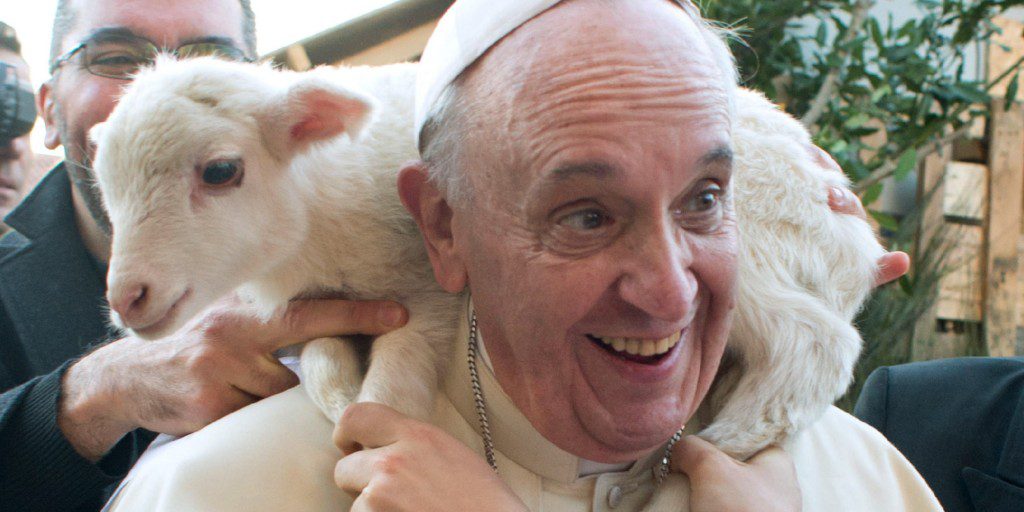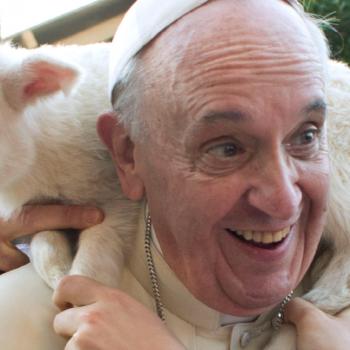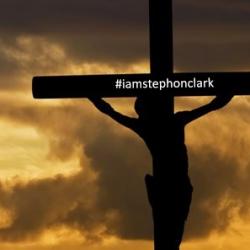The Golden Rule is one of the most familiar Christian teachings. Supposedly there’s a version of it in every major world religion. “Do unto others as you would have them do unto you” (Matthew 7:12). In a society that prides itself on self-sufficiency, the Golden Rule has a pretty banal meaning: live and let live. But Pope Francis’ retelling of the Golden Rule in his speech before Congress completely revolutionizes it in a way that destroys the sacred American pillar of individualism. For Francis, the Golden Rule means you are responsible for the well-being of everyone else.
If you take the words of the Golden Rule at face value in the context of American culture, it means basically don’t be a jerk when you’re interacting with other people. Don’t talk on your cell-phone loudly in the grocery line. Say please and thank you. Don’t man-spread when you’re riding on the subway. Mow your grass at least in the front where it impacts your neighbors’ property value. Don’t foul people dirty when you’re playing pickup basketball. Hold the door open for people when they’re carrying something heavy. Wait until the other person is done speaking before you start. Etc. Just don’t do anything you would think was rude if it happened to you.
In our culture, we’ve decided to accept a very narrow range of agency over which we take responsibility in our interactions with other people. While I would certainly appreciate my neighbors paying my mortgage if I lost my job and was facing eviction, I would never dream of asking them to. So that doesn’t fall under the Golden Rule. The Golden Rule is limited to being pleasant and congenial in the mostly banal circumstances in which we have to interact with others. We let the job market and the housing market and the various other markets take care of most of what actually impacts other peoples’ lives in our world. Because whether or not other people get laid off or evicted or ripped off or robbed or deported or exiled or otherwise oppressed is none of my business. As long as I’m nice to the people I talk to and don’t put any awkward burdens on them, then I can make peace with the fact that I don’t accept any awkward burdens from anyone else.
So here’s where Pope Francis blows this banal middle-class reduction of the Golden Rule out of the water:
Let us remember the Golden Rule: “Do unto others as you would have them do unto you” (Mt 7:12). This Rule points us in a clear direction. Let us treat others with the same passion and compassion with which we want to be treated. Let us seek for others the same possibilities which we seek for ourselves. Let us help others to grow, as we would like to be helped ourselves. In a word, if we want security, let us give security; if we want life, let us give life; if we want opportunities, let us provide opportunities. The yardstick we use for others will be the yardstick which time will use for us.
Francis brought up the Golden Rule in the context of discussing immigrants and refugees. “That’s not my problem” is one of the most sinful statements that American middle-class white people make. If we live by the Golden Rule the way that Francis understands it, that requires saying your problem is my problem. Living by the Golden Rule as Francis understands it is to support other people as though they are family. The reason our society’s idolatry of the nuclear family is so wickedly sinful is because it gives us the perfect excuse for not following the Golden Rule. We build a white picket fence around our responsibility for our spouse and children and completely wash our hands of responsibility for anyone outside the white picket fence. When I’m doting on my children and spouse, I can be as selfish as I want to be and call it altruism.
If Pope Francis is right, then self-sufficient autonomy is a sinful rebellion against the Golden Rule. Just because I can take care of myself and my family and don’t ask for help from anybody else doesn’t excuse me from helping others who ask me for help (or rather seeking out ways to help others whether they ask or not). I am called to seek for others the same possibilities which I seek for myself. I am called to get to know my neighbors well enough that I can know their struggles so they can become my struggles too. Do you know your neighbors’ struggles? I sure don’t know mine.
Imagine if we had a society that truly lived according to the radical solidarity the Golden Rule can be taken to mean. A socialist government is necessary to the degree that we fall short of creating that world organically. If you’re actually living out the Golden Rule by inviting homeless families to live in your house with you, then you have some credibility saying that caring for the poor should not be the government’s responsibility. Otherwise, you should be grateful that an infinitesimal percentage of your tax dollars are going to help people in ways that you would want to be helped if you were in their circumstances (even if you’re confident that a hard-working, responsible person like you could never fall on hard times).
The Pope has given us a challenge. It shouldn’t be controversial to anybody, religious or secular, liberal or conservative. But we’d rather blame other people for their circumstances and let ourselves off the hook. When it comes to solidarity, Jesus doesn’t let anybody off the hook.













